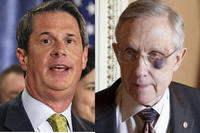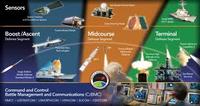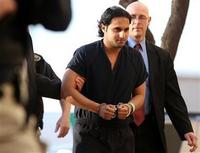-
Rep. McCaull urges Obama to reject calls from releasing the “blind sheik”

The new chairman of the House Homeland Security Committee, Representative Michael McCaul (R-Texas), on Tuesday urged President Obama to reject calls for the release of “the blind sheik” from federal prison; Omar Abdel-Rahman, a blind Egyptian cleric, was a preacher at a New Jersey mosque that served as a gathering place for the terrorists behind the 1993 attempt to blow up the Twin Towers; an FBI investigation found that he took an active part in planning the attack
-
-
Advocates of immigration reform eye Canada’s guest worker program as a model
When many Mexicans head north for seasonal work, they no longer have to smuggle their way through the U.S.–Mexican border; now they can hop a fight to Canada; in a government-to-government deal between Mexico and Canada, almost 16,000 temporary Mexican workers are able to earn good wages in Canada as part of a guest worker program; as discussions about immigration reform in the United States continue, some eye the Canadian guest worker program as a model to be emulated
-
-
Sen. David Vitter (R-La.) calls Sen. Harry Reid an "idiot” over Katrina comment

Last week, during a floor debate in the Senate on the $9.7 billion portion of the Sandy relief measure, Majority Leader Harry Reid (D-Nevada), who supported the measure, said: “The people of New Orleans and that area, they were hurt, but nothing in comparison to what happened to the people in New York and New Jersey”; in response, Sen. David Vitter (R-Louisiana) said: “Sadly, Harry Reid has again revealed himself to be an idiot”
-
-
U.S. spends more on immigration enforcement than on all other federal criminal law enforcement agencies combined

The United States has spent nearly $187 billion on federal immigration enforcement over the past twenty-six years — more than the spending on all other principal federal criminal law enforcement agencies combined; the nearly $18 billion spent on federal immigration enforcement in fiscal 2012 is approximately 24 percent higher than collective spending for the FBI, Drug Enforcement Administration, Secret Service, U.S. Marshals Service, and Bureau of Alcohol, Tobacco, Firearms and Explosives
-
-
France is the forerunner in nuclear power generation – but for how long?
France has been held up, worldwide, as the forerunner in using nuclear fission to produce electricity; a third of the nation’s nuclear reactors, however, will need replacing in the next decade, and public opinion has shifted toward reducing reliance on nuclear power; does France have the means or desire to unplug from nuclear power?
-
-
White House considering gun-control measures beyond assault weapons ban
Sources in the White House say the administration is considering a broader and strategy on guns control in the wake of the Newton, Connecticut, mass shooting; the approach being considered will go farther than a ban on certain types of assault weapons; the Biden task force, which will submit its recommendations to President Obama in a few weeks, is leaning toward adoption of measures recommended by the law enforcement community, among them requiring universal background checks for firearm buyers, tracking the movement and sale of weapons through a national database, strengthening mental health checks, and stiffening penalties for carrying guns near schools or giving them to minors
-
-
Congress approves first part of Sandy relief measure
Congress approved a $9.7 billion Sandy aid package last Friday after a two month delay; the delay was caused by fiscal cliff talks, warnings of federal funds cutbacks, and controversy over millions of dollars in unrelated projects; in two weeks, Congress will vote on the second part — an additional $50 billion Sandy relief package
-
-
FDA issues new food safety rules to fight contamination
One in six Americans becomes ill from eating contaminated food each year; most of them recover without harm, but bout 130,000 are hospitalized and 3,000 die; the FDA estimates the new food safety rules could prevent about 1.75 million illnesses each year
-
-
Arizona GOP senators to push for immigration reform
Arizona’s Republican Senators — veteran John McCain and newly elected Jeff Flake – let it be known that they would on the forefront of a bipartisan effort in Congress to overhaul U.S. immigration law; the two Arizona senators are now part of a bipartisan group of eight senators promoting a new comprehensive immigration reform plan
-
-
U.S.-born cleric Anwar al-Awlaki purchased tickets for 9/11 terrorists: FBI documents

Within two weeks of the 9/11 terrorist attacks, FBI investigators had information that New Mexico-born jihadi cleric Anwar al-Awlaki had purchased air travel tickets for some of the hijackers; the information is contained in newly released, and heavily redacted, FBI documents; it appears that after the 9/11 attacks, the FBI, rather than arrest al-Awlaki, tried to work with him or track him for intelligence purposes, to see whether he would lead the agency to sleeping-cell terrorists still in the United States; Al-Awlaki was killed by a CIA drone attack in Yemen in September 2011
-
-
Court: Justice Dept. does not have to disclose legal memo justifying targeted killing of U.S. citizens
Judge Colleen McMahon on Wednesday refused to order the Justice Department to disclose a memorandum which provided the legal justification for the targeted killing on September 2011 of Anwar al-Awlaki, a U.S. citizen; al-Awlaki, a fervent jihadi cleric, was killed in Yemen by a CIA drone
-
-
Facing bipartisan outrage, House leadership abandons plan to postpone Sandy relief vote
Responding to bipartisan outrage expressed by the New York and New Jersey congressional delegations, House Speaker John Boehner said he was committed to hold a House vote by 15 January on a large relief package for victims of Superstorm Sandy; in addition to abandoning the plan to postpone the vote, the House leadership also gave up on bringing to a vote the $27 billion relief measure proposed by the House Appropriations Committee, and instead will bring to a vote the White House-proposed and Senate-approved bill, which calls for $60.4 billion in disaster relief
-
-
Explosives found in NYC apartment of upscale couple

An apartment on Wet Ninth Street in New York, where Morgan Gliedman, 27, the daughter of a New York City physician, and her boyfriend, Aaron Greene, 31, son of the president of an acclaimed artwork-restoration business, live, was searched by police on Monday after a tip from a visitor to the apartment; the police discovered explosive ingredients, weapons, and bomb-making manuals; some described Greene as an “Occupy Wall Street activist,” but the police said they did not believe that Greene was active in any political movement, describing the couple as “admitted heroin addicts”
-
-
Comparing boost-phase to non-boost-phase ballistic missile defense

An expert panel set forth to provide an assessment of the feasibility, practicality, and affordability of U.S. boost-phase missile defense compared with that of the U.S. non-boost missile defense when countering short-, medium-, and intermediate-range ballistic missile threats
-
-
Report says regulation of foreign student program is deficient

The Student and Exchange Visitor Program (SEVP), a subset of Immigration and Customs Enforcement (ICE) within the Department of Homeland Security, oversees nearly 1.2 million foreign students and their dependents, plus close to 7,000 educational institutions; an new report finds that SEVP rarely exercises its enforcement authority
-
More headlines
The long view
Factories First: Winning the Drone War Before It Starts
Wars are won by factories before they are won on the battlefield,Martin C. Feldmann writes, noting that the United States lacks the manufacturing depth for the coming drone age. Rectifying this situation “will take far more than procurement tweaks,” Feldmann writes. “It demands a national-level, wartime-scale industrial mobilization.”
No Nation Is an Island: The Dangers of Modern U.S. Isolationism
The resurgence of isolationist sentiment in American politics is understandable but misguided. While the desire to refocus on domestic renewal is justified, retreating from the world will not bring the security, prosperity, or sovereignty that its proponents promise. On the contrary, it invites instability, diminishes U.S. influence, and erodes the democratic order the U.S. helped forge.
Fragmented by Design: USAID’s Dismantling and the Future of American Foreign Aid
The Trump administration launched an aggressive restructuring of U.S. foreign aid, effectively dismantling the United States Agency for International Development (USAID). The humanitarian and geopolitical fallout of the demise of USAID includes shuttered clinics, destroyed food aid, and China’s growing influence in the global south. This new era of American soft power will determine how, and whether, the U.S. continues to lead in global development.
Water Wars: A Historic Agreement Between Mexico and US Is Ramping Up Border Tension
As climate change drives rising temperatures and changes in rainfall, Mexico and the US are in the middle of a conflict over water, putting an additional strain on their relationship. Partly due to constant droughts, Mexico has struggled to maintain its water deliveries for much of the last 25 years, deliveries to which it is obligated by a 1944 water-sharing agreement between the two countries.
How Disastrous Was the Trump-Putin Meeting?
In Alaska, Trump got played by Putin. Therefore, Steven Pifer writes, the European leaders and Zelensky have to “diplomatically offer suggestions to walk Trump back from a position that he does not appear to understand would be bad for Ukraine, bad for Europe, and bad for American interests. And they have to do so without setting off an explosion that could disrupt U.S.-Ukrainian and U.S.-European relations—all to the delight of Putin and the Kremlin.”
How Male Grievance Fuels Radicalization and Extremist Violence
Social extremism is evolving in reach and form. While traditional racial supremacy ideologies remain, contemporary movements are now often fueled by something more personal and emotionally resonant: male grievance.
